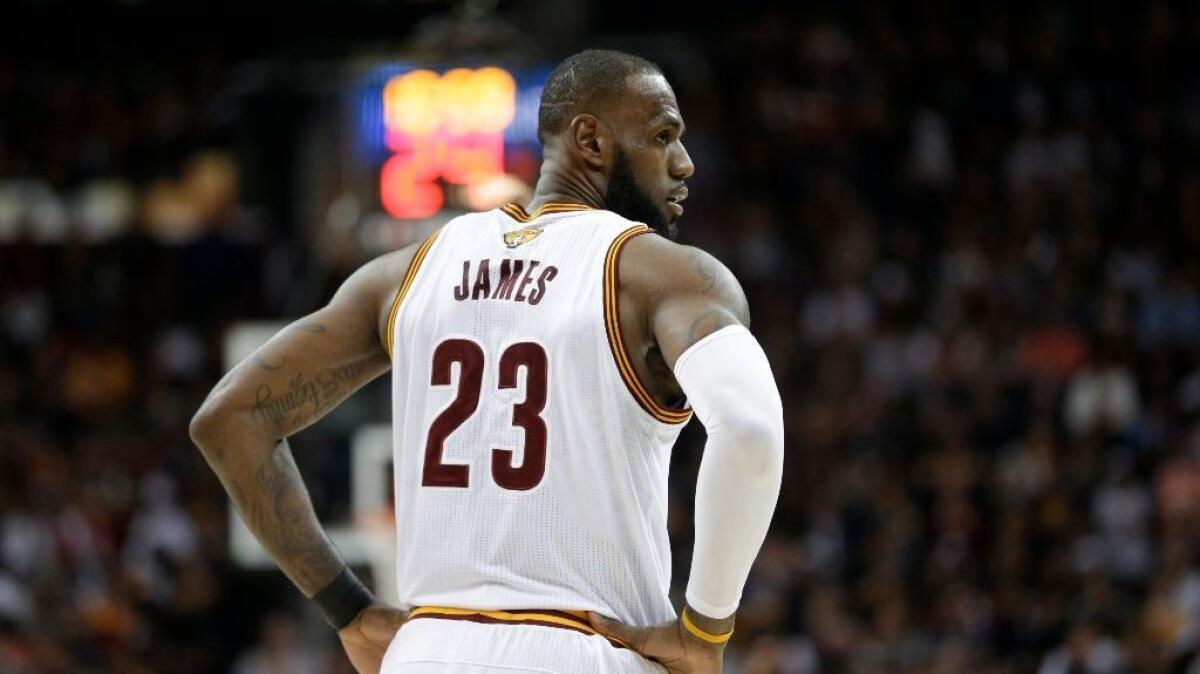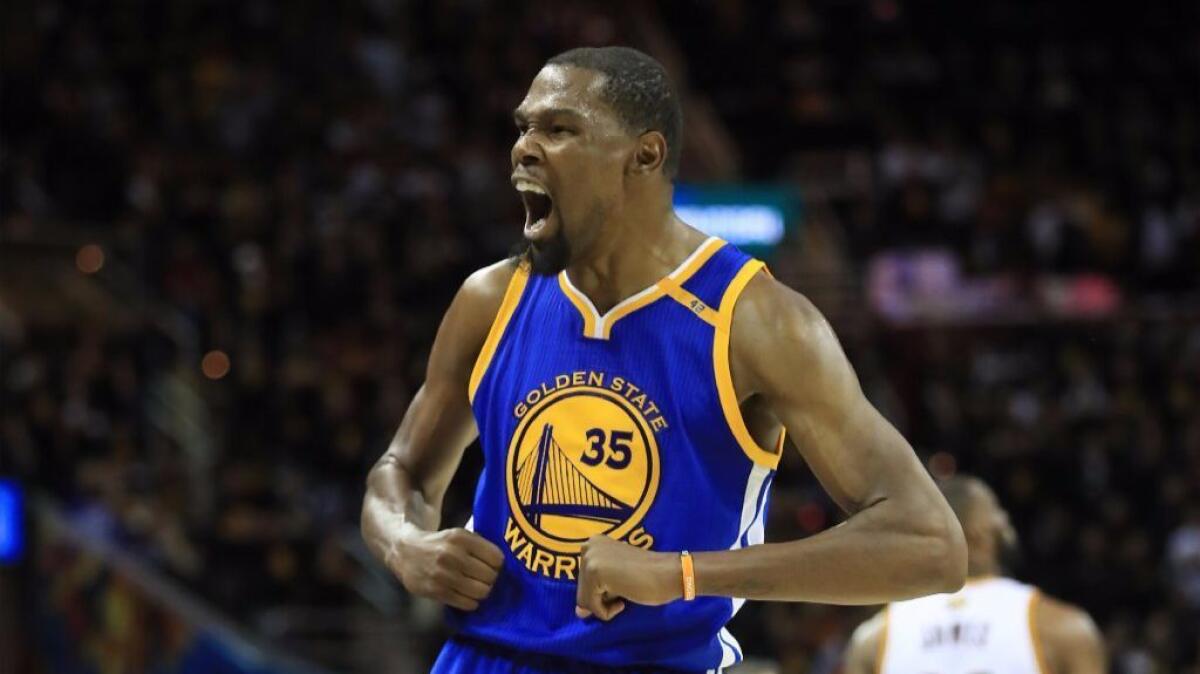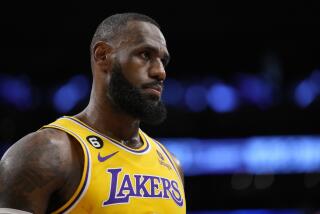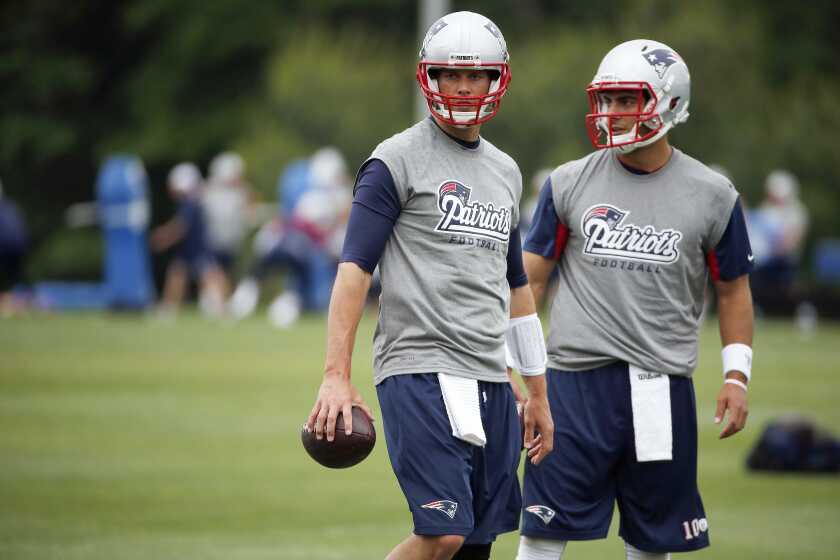You may not like the building of a dynasty, but LeBron James thinks it’s fair

Reporting from Cleveland — There was something calm about LeBron James’ demeanor early Thursday afternoon as he spoke about the Goliath he seemed to know he couldn’t beat.
“Is it fair?” James said the day after the Cleveland Cavaliers fell into a 3-0 deficit in the NBA Finals against the Golden State Warriors. “I don’t care. I mean, I think it’s great. It’s great for our league. Right now, look at our TV ratings, look at the money our league is pouring in. I mean, guys are loving the game, our fans love the game. I mean who am I to say if it’s fair or not? No matter who I’m going against, if I’m going against four Hall of Famers … or if I’m going against two or whatever the case may be, I’m always excited to play the game. And I’m not one to judge and say if it’s fair or not if guys are adding players to their team. …
“Is it fair that the New York Yankees in the ’90s were adding piece after piece after piece? I mean, if you have the opportunity to do that — is it fair that the Cowboys added Deion Sanders?”
A victory Friday in Game 4 would give the Warriors their second championship in three seasons and complete the first perfect postseason in NBA history at 16-0.
The Warriors should be this good again next season. And the year after. It could be a very long time until anyone closes the gap, and James probably will pay the biggest price.
He is the best player in the league, the best player in this series. That he was set for a third straight Finals matchup with the Warriors this June was a foregone conclusion six months ago. That it would be this lopsided once they met, few predicted.
Dynasties become more potent when juxtaposed with the opponents they vanquish.
How would the legacies of Karl Malone and John Stockton been different if they were not thwarted by Michael Jordan’s Chicago Bulls. What might Chris Webber’s career have been had he not played in the same division as the Lakers’ Shaquille O’Neal and Kobe Bryant at their peak?
James himself was part of a super team not long ago, but he sees a distinction between his Miami Heat teams and the Warriors, who were mostly built with players they drafted.
“My case, going to Miami, we had to clear a lot of [salary-cap] space because they didn’t have anybody as far as guys that they wanted to keep as far as [Larry] Bird rights besides U.D. [Udonis Haslem] and D-Wade,” James said. “They had the opportunity to go get two of us, and they did that in me and [Chris] Bosh, and then we were able to finagle a way to get Mike Miller because some of us took pay cuts, and got some other guys. We had Rio [Mario Chalmers] because he was drafted. But it was a different situation. Totally different. Totally different.”
James and Bosh signed with the Heat in 2010, joining Dwyane Wade to win championships. They won two, in 2012 and 2013. They lost twice in the Finals, to the Dallas Mavericks in 2011 and to San Antonio Spurs in in 2014.
Jordan’s stranglehold on the NBA intensified during his second run of three consecutive titles, when the Bulls added future Hall of Famer Dennis Rodman to a roster that already had enough talent to win a championship. Warriors coach Steve Kerr played on that team.
“You don’t really stop and think about it until after,” Kerr said. “I think we swept Orlando in the conference finals, which was probably the biggest accomplishment because that was a loaded team. Shaq and Penny [Hardaway] and we took care of business. And then went up 3-0 in the Finals, had a little bit of a letdown [to the Seattle Supersonics]. That was a great team, too, with Gary Payton and Shawn Kemp, Hersey Hawkins, that group.”

The Bulls won 72 games that season (1995-96), lost one game in the first three rounds of the playoffs, then won the Finals 4-2.
The team Kerr is coaching now seems even more invincible.
The Warriors won a record 73 games during the 2015-16 season, but fell short in a seven-game series against the Cavaliers in the Finals. The series changed when Golden State’s Draymond Green was suspended for Game 5. The Warriors lost a 3-1 lead, becoming the first team in Finals history to do so.
That loss smarted, but helped them attract Kevin Durant, then a seven-time All Star, four-time scoring champion and 2014 league MVP. He wanted to win. They sold him on how much fun he would have joining this group, playing with the culture they had formed.
They had the space to do it because the salary cap rose more than $24 million heading into the 2016-17 season. It allowed the Warriors to sign Durant to a two-year deal worth $54 million. Despite some early bumps — they lost their season opener, then in their sixth game lost to the Lakers, who finished this season 26-56. Quickly, though, their greatness revealed itself. They went a league-best 67-15 in the regular season and swept their first three postseason series.
In the East, the Cavaliers also coasted through the playoffs, losing only one game before bumping into the Warriors. That’s what led to these questions of fairness, posed to James and other players.
“One thing about the NBA is there’s this thing called the salary cap that only allows you to do so much,” Green said. “It allowed us to sign Kevin Durant. In that case, it’s got to be fair. You can’t do things that’s unfair with the salary cap. We abide by the same rules everybody else does.”
That’s one way of looking at it. One could also argue that sports aren’t supposed to be fair. You win on the court by winning the game off it, too. And the Warriors certainly did that.
“I mean, listen,” James said with an air of understanding. “It happens. It’s sports. You have an opportunity to sign one of the best players and you can do it, go ahead and do it. Why not? If I become an owner, I’m going to try to sign everybody.”
Follow Tania Ganguli on Twitter @taniaganguli
More to Read
Go beyond the scoreboard
Get the latest on L.A.'s teams in the daily Sports Report newsletter.
You may occasionally receive promotional content from the Los Angeles Times.











